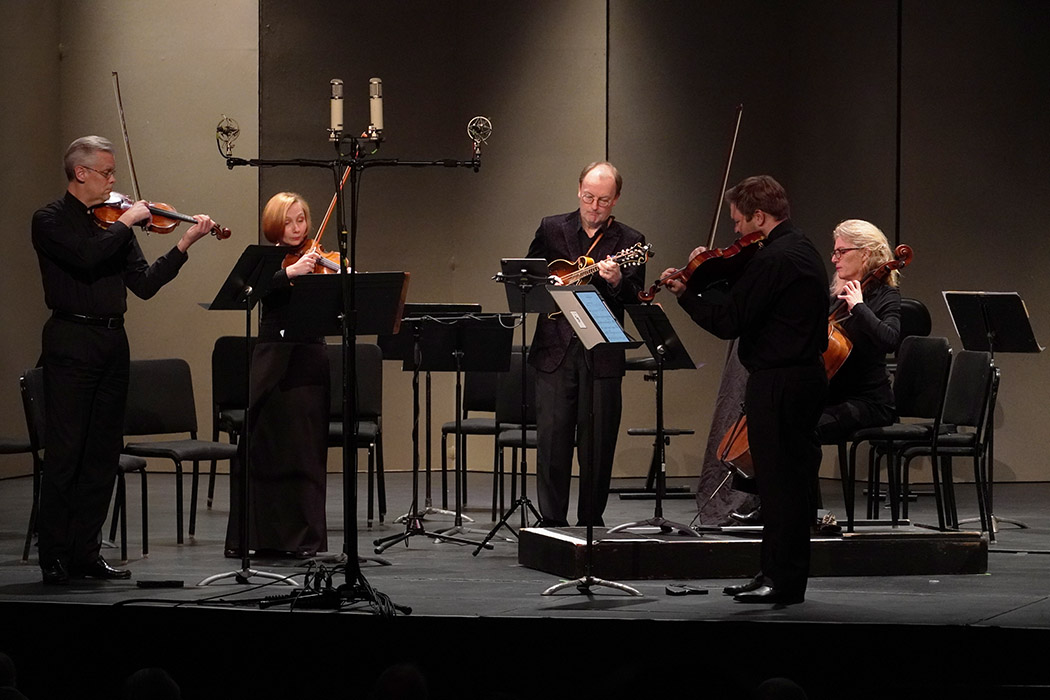Knoxville’s Bijou Theatre enjoys a whirlwind of concert bookings during its busy season, covering every imaginable genre of performance from every imaginable description of performer. Few of these guests, however, can showcase and illuminate the hall’s stunningly intimate acoustics as can the Knoxville Symphony Chamber Orchestra. This point was made and re-made on Sunday’s Chamber Classics Series concert that featured a program of three works for strings, all quite different, but all making full use of the theatre’s uncanny ability to deliver an amazingly detailed listening experience to every corner of the landmark venue.
KSO Maestro Aram Demirjian introduced the afternoon with a work by Dame Ethyl Smyth (1858–1944), the Suite for Strings. Like many talented female composers over the last few centuries, Smyth was denied the recognition and reputation in her lifetime due to the gender bias that marginalized her despite her talent and abilities. Although she was made a Dame Commander of the Order of the British Empire in 1922 and received numerous honors for her work for women’s suffrage, regular programming of her music by orchestras has only come in the last few years. The KSO performed her music for the first time last March—the Overture to her opera The Boatswain’s Mate.
The Smyth Suite for Strings in five movements was an arrangement of her String Quintet in E Major from 1884, expanded to a chamber orchestra complement of violins, violas, cellos, and double basses. Like the afternoon’s concluding work, Dvořák’s Serenade for Strings, the Smyth Suite was in the perfect environment—one in which the Bijou’s acoustics capture every subtle musical gesture and string texture, extending the perception of listenable dynamics from ultra-soft to the very bold. Of course, just as someone in the hall’s back row will hear the detailed magic, they will also be privy to an unfortunate slip, should one occur.
The titular work on the Sunday afternoon program was Jeff Midkiff’s Mandolin Quintet No. 2 (“the Gypsy”) with the composer performing on mandolin. In addition to composing for the mandolin, Midkiff is also a music educator and Orchestra Director for the Roanoke City (VA) Schools, not to mention an orchestral clarinetist. As a result, his Quintet connects the worlds of bluegrass/folk with classical chamber music in a way that is unpretentious and honest. Although one could easily argue that the quintet is actually a work for mandolin and string quartet—the mandolin taking an unabashed solo role in both form and texture—it hardly matters. One admires Midkiff’s virtuosity and the rhythmic and harmonic journey he charts for us on Appalachian and Slavic paths. Performing brilliantly with Midkiff were Sean Claire and Sofia Glashauser, violins; Joshua Ulrich, viola; and Stacy Nickell, cello.

The Antonin Dvořák Serenade for Strings in E Major occupies a special place in the hearts of many. Written some twenty years prior to the Dvořák Cello Concerto heard last week in the KSO’s Masterworks concerts, the Serenade, played lovingly here by Demirjian and the Chamber Orchestra, had both a lyrical flow and a necessary controlled angst. The ensemble allowed the piece to dance, albeit with tentative tenderness. Admittedly, the rainy afternoon was both opponent and companion in the performance, but this was not the time for nodding heads or drooping eyelids. The piece’s lyrically sweet exhalation was simply too strong and too joyfully demanding.







